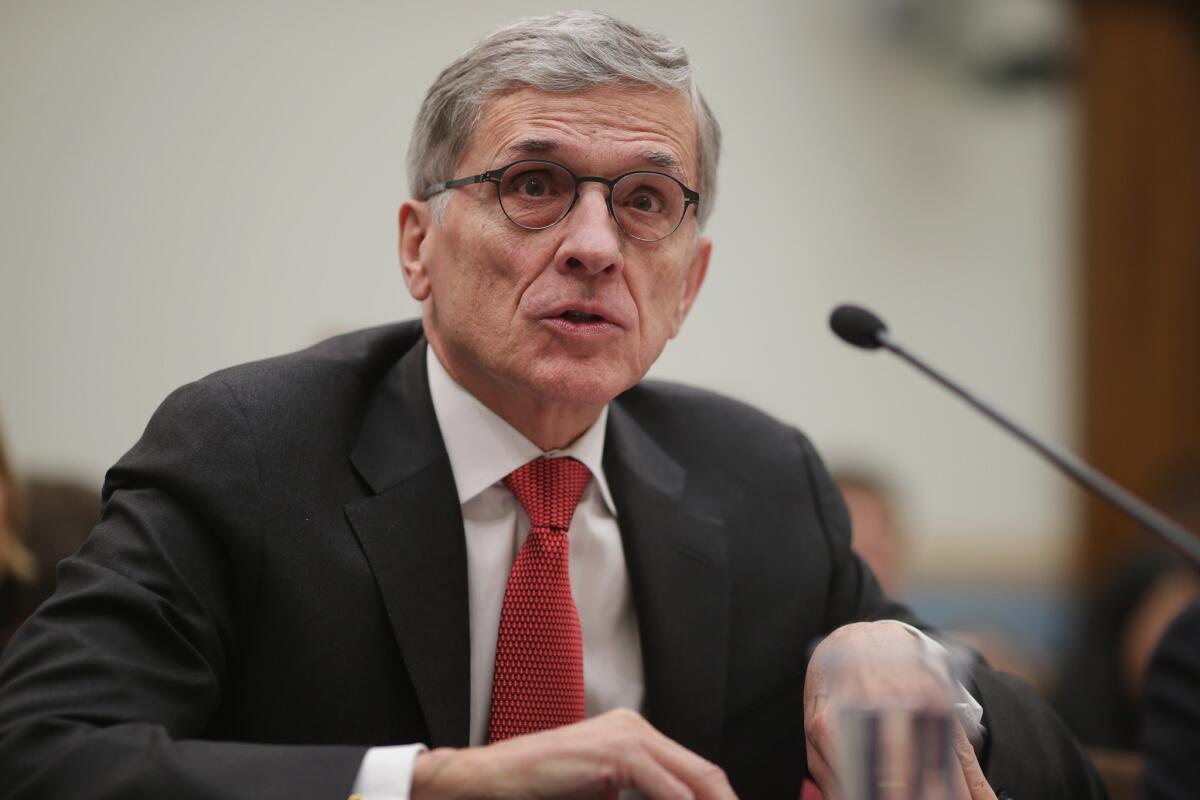Opponents of FCC’s net neutrality rules ask court for partial stay

Federal Communications Commission Chairman Tom Wheeler testifies before the House Judiciary Committee in March.
- Share via
Reporting from Washington — AT&T Inc. and other opponents of tough new federal net neutrality regulations asked a federal court on Wednesday to halt implementation of the most controversial provision until lawsuits challenging the rules are decided.
Telecom companies and trade groups said the decision by the Federal Communications Commission in February to classify broadband Internet service as a highly regulated utility will impose “immense burdens and costs” that would not be undone if the agency’s order ultimately is overturned in court.
“Such relief is necessary to avoid the serious and substantial harms that service providers and consumers alike will bear if the FCC is allowed to subject the modern Internet to this antiquated regulatory regime,” said Michael Powell, president of the National Cable & Telecommunications Assn. trade group.
The new regulations, designed to ensure that broadband providers don’t discriminate against any legal content flowing through their networks to consumers, are set to take effect June 12.
If a stay is not granted, pending lawsuits should be expedited, according to the joint petition the companies and trade groups filed in the U.S. Court of Appeals for the District of Columbia Circuit.
Twice before, the industry has won court orders tossing out similar rules.
FCC spokeswoman Kim Hart said the opponents “have not demonstrated that they will suffer irreparable injury if the order takes effect, and the public interest clearly favors” allowing the rules to become effective in June.
“We are confident that the court will deny the request for a stay,” she said.
AT&T and the National Cable & Telecommunications Assn. were joined in the stay request by Centurylink, CTIA -- The Wireless Assn., the American Cable Assn., U.S. Telecom and the Wireless Internet Service Providers Assn.
The groups said they were not seeking a delay in implementation of new FCC regulations prohibiting broadband providers from blocking, slowing or selling priority delivery of content to consumers.
Cable and wireless companies and trade groups have said they do not have a problem with those net neutrality provisions.
But they want the new classification of broadband to be halted pending the outcome of the lawsuits.
The companies and groups said they object to the FCC’s decision to enact those rules by classifying high-speed Internet service as a telecommunications service under Title 2 of the Communications Act, subjecting it to utility-like regulation.
That was the most controversial part of the FCC’s net neutrality order, which was passed on a partisan 3-2 vote by the Democratic-controlled agency.
The classification “unlawfully paves the way toward expansive government management of the Internet,” said U.S. Telecom President Walter McCormick.
FCC Chairman Tom Wheeler, who crafted the net neutrality regulations, has said the classification is crucial to the agency’s ability to enforce the rules.
Wheeler has promised a light-handed approach to the regulations to avoid damaging the Internet economy. The order also exempts broadband from many of the Title 2 provisions that apply to telephone service, such as rate regulation.
But much of the broadband industry ardently opposes the classification. The same companies and groups asked the FCC to stay implementation of the regulations, but the agency rejected that request last week.
Twitter: @JimPuzzanghera
More to Read
Inside the business of entertainment
The Wide Shot brings you news, analysis and insights on everything from streaming wars to production — and what it all means for the future.
You may occasionally receive promotional content from the Los Angeles Times.











